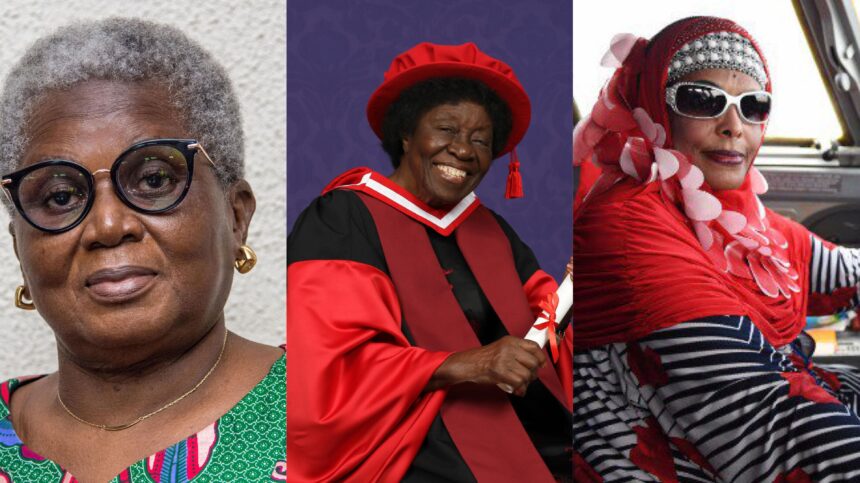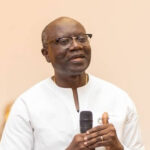Dr. Letitia Obeng: A Legacy of Science, Leadership, and Inspiration
In a world where glass ceilings still exist, few women have broken as many barriers as Dr. Letitia Eva Takyibea Obeng. A pioneer in freshwater biology and environmental science, she was not just Ghana’s first female scientist with a PhD—she was a force of nature, shaping policies, research, and development in ways that continue to impact the nation and beyond. Her passing at the age of 99 is a profound moment for reflection, appreciation, and a renewed commitment to the ideals she stood for.
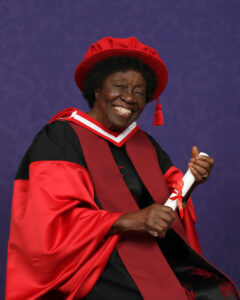
A Scientist Ahead of Her Time
At a time when few African women dared to dream of a career in science, Dr. Obeng carved her own path. Achieving a doctorate in freshwater biology from the University of Birmingham in 1964, she became a trailblazer in environmental research, focusing on the health and economic implications of Ghana’s water resources. Her work on bilharzia and the environmental impact of the Akosombo Dam was not just scientific inquiry—it was a service to humanity.
A Leader in Development and Environmental Policy
Dr. Obeng’s influence stretched far beyond the laboratory. She became a director at the United Nations Environment Programme (UNEP) and contributed immensely to global environmental governance. Her work at the World Bank championed policies that improved sanitation and water systems in developing nations, addressing issues that continue to challenge Africa today. She was a woman who understood that science was not just about discovery—it was about making life better for people.
A Champion for Women in STEM
For generations of young Ghanaian women, Dr. Obeng was more than an icon; she was proof that no ambition was too great. In a field dominated by men, she stood firm, proving that gender should never be a barrier to excellence. Her mentorship and advocacy opened doors for many, laying the foundation for the growing number of women in STEM in Ghana and across Africa today.
Honoring Her Legacy
As Ghana mourns the loss of this formidable scientist and leader, the question remains: How do we honor her legacy? True commemoration goes beyond tributes and ceremonies. It is seen in investments in science education for girls, in funding for research that addresses Africa’s environmental challenges, and in policies that prioritize sustainable development.
Dr. Letitia Obeng’s story is not just one of individual triumph—it is a call to action. It reminds us that talent, when nurtured and given opportunity, can transform a nation. As we bid farewell to a legend, we must ask ourselves: Who will rise to continue the work she started? The answer lies in every young scientist, every policymaker, and every advocate willing to challenge the status quo.
Dr. Obeng may be gone, but her impact is eternal. May her legacy inspire a future where science, leadership, and determination know no bounds.
Susanna Al-Hassan: The Trailblazer Who Paved the Way for Women in Ghanaian Politics
In the annals of Ghanaian history, few names stand as tall as Susanna Al-Hassan. A woman of firsts, she shattered barriers at a time when leadership was a domain dominated by men. Her legacy, spanning politics, education, and literature, remains an enduring testament to her resilience and vision.
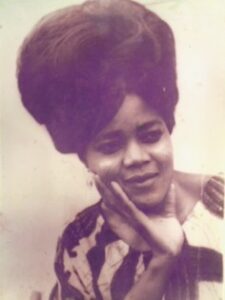
A Trailblazer from the North
Born on November 27, 1927, in Tamale, Susanna Al-Hassan’s journey was one of determination and purpose. Educated at the prestigious Achimota School, she embodied the spirit of excellence that propelled her into leadership. Her early career as the headmistress of Bolgatanga Girls’ Middle School from 1955 to 1960 foreshadowed her lifelong commitment to education and the empowerment of women.
Breaking Political Barriers
Ghana’s post-independence political landscape was an evolving space, but one that remained largely inaccessible to women. Al-Hassan changed that narrative. In 1960, she became a Member of Parliament for the Northern Region, marking her entry into national politics. Just a year later, President Kwame Nkrumah appointed her as Deputy Minister of Education, making her not only Ghana’s first female minister but also the first African woman to hold a cabinet position.
Her influence in government extended further when she was appointed Minister of Social Affairs in 1963, a position she held until 1966, and briefly again in 1967. Her tenure was marked by a staunch advocacy for women’s rights, particularly in the northern regions, where she sought to address issues such as child marriage, prostitution, and gender inequality in education.
A Voice for Social Change
Al-Hassan’s impact was not limited to the corridors of power. She was an active voice in Ghana’s social transformation, recognizing that true progress required a cultural shift. She spearheaded initiatives aimed at improving the status of women and girls, reinforcing the idea that education was the most powerful tool against systemic oppression.
Her influence also extended into the literary world. She authored several children’s books, including Issa and Amina (1963), Asana and the Magic Calabash (1963), and Two Tales (1966). Through storytelling, she sought to inspire the younger generation and preserve the cultural heritage of Ghana.
A Lasting Legacy
Susanna Al-Hassan’s contributions to Ghana’s political and social fabric cannot be overstated. Her work laid the groundwork for future generations of women who now occupy positions of influence in government and public service. Though she passed away on January 17, 1997, her legacy continues to be celebrated. In 2007, she was honored with a commemorative stamp, a fitting tribute to a woman who changed the course of Ghanaian history.
As Ghana continues to navigate its democratic journey, the story of Susanna Al-Hassan serves as a reminder that true leadership is not bound by gender but by the courage to defy expectations. She was more than a politician; she was a movement, a force that set the stage for countless women to follow. Today, as we celebrate her achievements, we must also ask ourselves: How can we continue her work? The answer lies in breaking barriers, uplifting voices, and ensuring that no dream is beyond reach for the next generation of Ghanaian women.
Melody Millicent Danquah: A Trailblazer Who Defied the Skies
In the annals of African aviation, the name Melody Millicent Danquah soars as a beacon of courage, determination, and excellence. She was not merely Ghana’s first female pilot; she was a symbol of what women could achieve in a male-dominated field, shattering ceilings both in the skies and in society. Her journey was not just one of personal triumph but a testament to the power of breaking barriers and inspiring future generations.
Born on January 6, 1937, in Larteh Akuapem, Ghana, Danquah’s story began in a family that valued discipline and education. As the sixth of ten children to Ibinijah Rexford Addo-Danquah and Selina Gyamfi, she had a foundation built on resilience and ambition. She received her early education at Methodist Primary and Middle schools in Larteh before proceeding to the prestigious Wesley Girls’ High School in Cape Coast. Little did she know that she was destined for history.
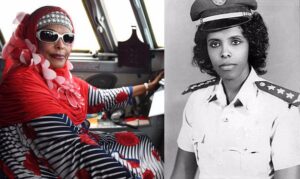
Her entry into aviation was sparked by a call from Ghana’s first president, Kwame Nkrumah, who sought to integrate women into the Ghana Air Force in 1963. At a time when the sight of a female pilot was almost unheard of, Danquah stood tall among the three pioneering women selected for training. Her resolve, coupled with exceptional aptitude, led to her historic solo flight on June 22, 1964, in a de Havilland Canada DHC-1 Chipmunk aircraft. That moment was more than just a personal milestone—it was a defining moment for women in aviation across Africa.
By April 15, 1965, she had earned her pilot wings, presented to her by Ghana’s Defense Minister, Kofi Baako. But her journey was far from over. Beyond her skills in the cockpit, Danquah demonstrated leadership and adaptability. When her flying career ended in 1968, she seamlessly transitioned into administrative roles within the Ghana Armed Forces, where she served until her honorable discharge in 1984. Her service was recognized with the Long Service Award and the Efficiency Medal, acknowledgments of her dedication and excellence.
Despite leaving the military, Danquah’s spirit of service never dimmed. She briefly worked with the World Food Programme and the National Service Secretariat, continuing to contribute to national development. In an inspiring turn later in life, she earned a Diploma in Bible Studies and Theology, becoming a lay preacher in military circles. She was also an influential board member of the Ghana Institute of Management and Public Administration (GIMPA), showcasing her versatility beyond aviation.
Her legacy did not go unnoticed. In 2006, President John Agyekum Kufuor honored her with the Companion of the Order of the Volta, one of Ghana’s highest national honors. She was again recognized during the 2017 International Women’s Day celebrations as a trailblazer who paved the way for women in aviation and leadership.
Melody Danquah took her final flight on March 18, 2016, but her influence endures. She is survived by her daughter, Professor Angela Lamensdorf Ofori-Atta, a Clinical Psychologist at the University of Ghana School of Medicine and Dentistry, and three grandchildren. Yet, her true legacy is far greater—it lives in every Ghanaian girl who dares to dream beyond limitations, in every young woman who aspires to enter male-dominated industries, and in every leader who values service, integrity, and excellence.
Melody Millicent Danquah was more than just a pilot—she was a pioneer, a leader, and an inspiration. Her story reminds us that barriers exist to be broken and that the sky, quite literally, is not the limit.
Honoring the Legacy of Professor Florence Dolphyne
In a world where the pursuit of knowledge is often met with barriers, a select few rise above challenges to redefine history. One such trailblazer is Professor Florence Abena Dolphyne, a pioneering academic, linguist, and advocate for women’s empowerment. Her remarkable journey from humble beginnings to becoming the first female professor and Pro-Vice-Chancellor of the University of Ghana is a testament to resilience, intellectual brilliance, and an unwavering commitment to progress.
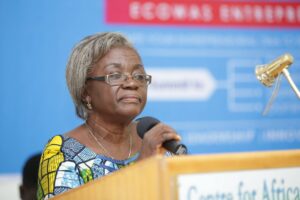
Born in 1938 in Akyinakrom, Ashanti Region, Professor Dolphyne’s early years were shaped by economic challenges. Yet, her determination never wavered. Her academic journey took her from Wenchi Methodist Primary School to Wesley Girls’ High School, then to Mfantsipim School—where she became the first female student to receive a prize. She went on to earn a Bachelor of Arts in English from the University of Ghana in 1961 before obtaining a Ph.D. in Phonetics and Linguistics from the School of Oriental and African Studies, University of London, in 1965.
Her appointment as a lecturer at the University of Ghana marked the beginning of a transformative career. Over 36 years, she played a pivotal role in shaping linguistic studies in Ghana, heading the Department of Linguistics and Ghanaian Languages, and serving as Dean of the Faculty of Arts. In 1996, she shattered yet another glass ceiling, becoming the first female Pro-Vice Chancellor of the university—a milestone that paved the way for future generations of women in academia.
Beyond the confines of academia, Professor Dolphyne’s impact has been far-reaching. A fierce advocate for gender equality, she led the National Council on Women and Development and chaired the Ghana Education Service Council. Her influence extended into policy-making, ensuring that women had a voice in national development. Her contributions also earned her a role on the National Reconciliation Commission, a testament to her dedication to fostering unity and justice.
Her scholarly work remains a cornerstone of linguistic studies in Ghana. Titles such as The Akan (Twi-Fante) Language: Its Sound Systems and Tonal Structure and A Comprehensive Course in Twi (Asante) for the Non-Twi Learner have significantly advanced the understanding and preservation of Ghanaian languages. Through her writings and teachings, she has ensured that indigenous languages are not only studied but celebrated.
Professor Dolphyne’s legacy is one of breaking barriers, challenging conventions, and inspiring generations. Her life’s work embodies the power of education as a tool for transformation. As Ghana and the world continue to push for inclusivity in academia and leadership, her story serves as a guiding light—a reminder that true progress is forged by those who dare to dream beyond the limitations of their time.
As we celebrate her achievements, we must also recognize the responsibility to build on her legacy. Investing in education, particularly for young women, and fostering environments where knowledge and leadership thrive are ways to honor her contributions. The foundations she laid must serve as stepping stones for the next generation of scholars, linguists, and change-makers.
Professor Florence Dolphyne is more than an academic; she is an icon of excellence, a champion of progress, and an enduring inspiration. Her story is one that must be told, retold, and celebrated—not just as history, but as a blueprint for the future.
Elizabeth Ohene: A Legacy of Journalism, Politics, and Public Service
In an era where the truth is often contested, and the voices of women in leadership are still striving for prominence, the legacy of Elizabeth Ohene stands as a testament to resilience, intelligence, and unwavering dedication to public service. As a journalist, writer, and politician, she has been a formidable force in Ghana’s socio-political and media landscape.
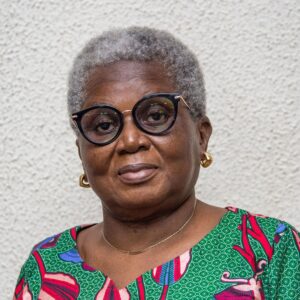
Born on January 24, 1945, in Ho, Volta Region, Ghana, Ohene’s journey into the intellectual sphere began at Mawuli School, where she laid the foundation for her illustrious career. She furthered her education at the University of Ghana, Legon, obtaining a Bachelor of Arts (Honors) degree in English in 1967. Her insatiable thirst for knowledge led her to the University of Indiana, Bloomington, USA, where she earned a Mass Communication Certificate in 1971. These academic pursuits equipped her with the tools to become one of Ghana’s most distinguished journalists.
Ohene’s journalism career commenced at the Daily Graphic, where she rose through the ranks to become the first female editor at the newspaper. Her tenure was marked by fearless and principled reporting, often challenging the status quo and holding the powerful accountable. Her work earned her respect but also placed her in the crosshairs of political persecution, especially during the military rule of the 1980s. Forced into exile, she continued her journalistic mission at the BBC World Service in London, where she became an influential African voice in global media.
Beyond journalism, Ohene made a significant impact in politics and governance. Under President John Agyekum Kufuor’s administration, she served as the Minister of State for Education, Science, and Sports. In this role, she championed reforms that sought to improve Ghana’s education system, emphasizing accessibility and quality. Her contributions extended beyond policy; she was instrumental in shaping national discourse on governance, transparency, and democratic development.
Elizabeth Ohene’s legacy is one of courage and commitment to truth. She remains an inspiration to young journalists, women in leadership, and all who believe in the power of knowledge and service. Her story is a reminder that integrity in journalism and governance is not only necessary but also possible, even in the face of adversity. As Ghana continues to evolve, her contributions will undoubtedly remain a beacon for generations to come.


